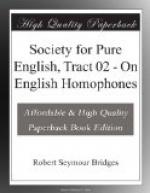I see the deep’s untrampled floor
With green and purple seaweeds strewn:
here seaweeds is risky, but I see the sea’s untrampled floor would have been impossible: even the familiar
The sea saw that and fled
is almost comical, especially because ‘sea saw’ has a most compromising joint-tenant in the children’s rocking game
See saw Margery daw.
The awkwardness of these English homophones is much increased by the absence of inflection, and I suppose it was the richness of their inflections which made the Greeks so indifferent (apparently) to syllabic recurrences that displease us: moreover, the likeness in sound between their similar syllables was much obscured by a verbal accent which respected the inflection and disregarded the stem, whereas our accent is generally faithful to the root.[10] This sensitiveness to the sound of syllables is of the essence of our best English, and where the effect is most magical in our great poets it is impossible to analyse.
[Footnote 10: Wherever this is not so—as in rhetoric, rhetorical, rhetorician, company, companion, &c.—we have a greater freedom in the use of the words. Such words, as Dr. Bradley points out, giving Canada, Canadian as example, are often phonetic varieties due to an imported foreign syntax, and their pronunciation implies familiarity with literature and the written forms: but very often they are purely the result of our native syllabising, not only in displacement of accent (as in the first example above) but also by modification of the accented vowel according to its position in the word, the general tendency being to make long vowels in monosyllables and in penultimate accents, but short vowels in antepenultimate accents. Thus come such differences of sound between opus and opera, omen and ominous, virus and virulent, miser and miserable, nation and national, patron and patronage, legal and legislate, grave and gravity, globe and globular, grade and gradual, genus and general, female and feminine, fable and fabulous, &c. In such disguising of the root-sound the main effect, as Dr. Bradley says, is the power to free the derivative from an intense meaning of the root; so that, to take his very forcible example, the adjective Christian, the derivative of Christ, has by virtue of its shortened vowel been enabled to carry a much looser signification than it could have acquired had it been phonetically indissociable from the intense signification of the name Christ. This freedom of the derivative from the root varies indefinitely in different words, and it very much complicates my present lesser statement of the literary advantage of phonetic variety in inflexions and derivatives.




